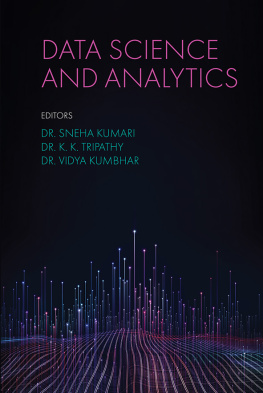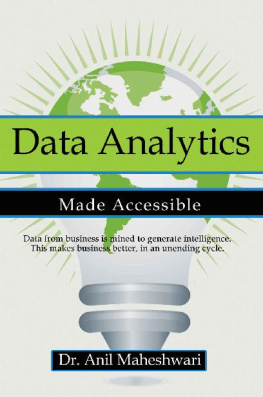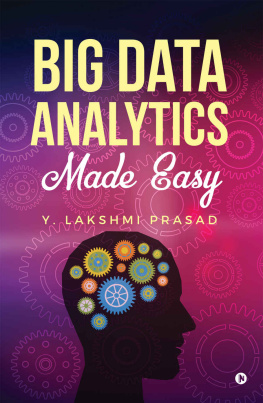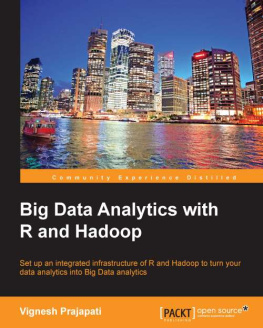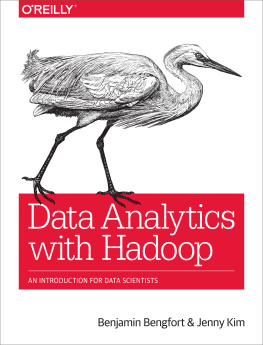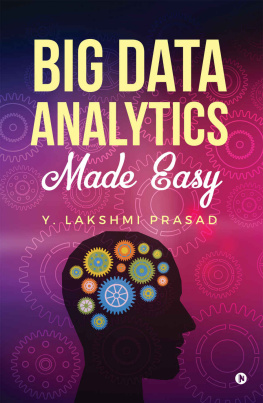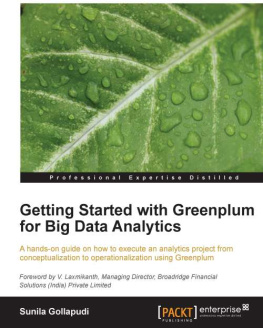Andrea De Mauro - Data Analytics Made Easy
Here you can read online Andrea De Mauro - Data Analytics Made Easy full text of the book (entire story) in english for free. Download pdf and epub, get meaning, cover and reviews about this ebook. year: 2021, publisher: Packt, genre: Home and family. Description of the work, (preface) as well as reviews are available. Best literature library LitArk.com created for fans of good reading and offers a wide selection of genres:
Romance novel
Science fiction
Adventure
Detective
Science
History
Home and family
Prose
Art
Politics
Computer
Non-fiction
Religion
Business
Children
Humor
Choose a favorite category and find really read worthwhile books. Enjoy immersion in the world of imagination, feel the emotions of the characters or learn something new for yourself, make an fascinating discovery.
- Book:Data Analytics Made Easy
- Author:
- Publisher:Packt
- Genre:
- Year:2021
- Rating:3 / 5
- Favourites:Add to favourites
- Your mark:
- 60
- 1
- 2
- 3
- 4
- 5
Data Analytics Made Easy: summary, description and annotation
We offer to read an annotation, description, summary or preface (depends on what the author of the book "Data Analytics Made Easy" wrote himself). If you haven't found the necessary information about the book — write in the comments, we will try to find it.
Data Analytics Made Easy — read online for free the complete book (whole text) full work
Below is the text of the book, divided by pages. System saving the place of the last page read, allows you to conveniently read the book "Data Analytics Made Easy" online for free, without having to search again every time where you left off. Put a bookmark, and you can go to the page where you finished reading at any time.
Font size:
Interval:
Bookmark:

Data Analytics Made Easy
Use machine learning and data storytelling in your work without writing any code
Andrea De Mauro

BIRMINGHAM - MUMBAI
Data Analytics Made Easy
Copyright 2021 Packt Publishing
All rights reserved. No part of this book may be reproduced, stored in a retrieval system, or transmitted in any form or by any means, without the prior written permission of the publisher, except in the case of brief quotations embedded in critical articles or reviews.
Every effort has been made in the preparation of this book to ensure the accuracy of the information presented. However, the information contained in this book is sold without warranty, either express or implied. Neither the author, nor Packt Publishing or its dealers and distributors, will be held liable for any damages caused or alleged to have been caused directly or indirectly by this book.
Packt Publishing has endeavored to provide trademark information about all of the companies and products mentioned in this book by the appropriate use of capitals. However, Packt Publishing cannot guarantee the accuracy of this information.
Producer: Tushar Gupta
Acquisition Editor Peer Reviews: Saby Dsilva
Content Development Editor: Bhavesh Amin
Technical Editor: Gaurav Gavas
Project Editor: Namrata Katare
Copy Editor: Safis Editing
Proofreader: Safis Editing
Indexer: Tejal Daruwale Soni
Presentation Designer: Ganesh Bhadwalkar
First published: August 2021
Production reference: 1250821
Published by Packt Publishing Ltd.
Livery Place
35 Livery Street
Birmingham B3 2PB, UK.
ISBN 978-1-80107-415-5
www.packt.com
Writing a book that tries to combine theory and practice of such a vast field has been possible only thanks to the eye-opening inputs, the rigorous feedback, and the heartfelt encouragement of so many wonderful people. Towards all those colleagues and friends, I am now left with a sense of profound gratitude. Although writing the names of some of them does not do them full justice, let me thank: Dimitrios Skoufakis, Maria Navrotskaya, Francesco Pisan, Salvatore Gatto, Leonardo and Alessandro De Mauro, Lenka Dzurendova, Michele Pacifico (how could I do without his brilliant advice?), Adam Graham, Kate Daley, Angelo Spedicati, Francesco Lefons, Marcin Czajkowski, Alessio Villardita, Antonio Faraldi, Giorgio Binenti, Giuseppe Papaianni, Jacek Ludwig Scarso, Jon Thomson, Piril Paker Yagli, Paolo Palazzo, Gilda Notaro (whom I dearly miss), Felice Di Tanno, Giorgio Demetrio, Roberto Bellotti, Marcello Lando, my dear parents Gianfranco and Maria Teresa, Dyi Huijg, Cristina Trapani-Scott and all the other hosts at the Shut Up & Write! events that accompanied so much of my evenings and weekend writing, Katia Cocca, Davide D'Emiliano, Simona Palomba, Luisa Fabro, Antonio Gatto, Daniela Meo, Rachel Breslin, Laurent Eyers, Antonella Rossi, Kasia Bojanowska, Fabio Pistilli, Jerryn Cherian, Saurabh Dichwalkar, Michael Leonhardt, Kacper Hankiewicz, Nori Reis, Tutku Oztekin, Carolina Martinez, Miguel Estrella (the picture of me on the front cover is his, although I recognize thatgiven the poor subjectit doesn't give full justice to his outstanding skills as a photographer), Mario Galietti, Nicola Lopez, Antonio Fazzari, Paola Lucetti, Vinay Ahuja, Giuliana Farbo, Taide Guajardo, Luca Merlo, Paolo Grue, Francesca Sagramora, Nicolas Kerling, Guy Peri, and all the other amazing friends, colleagues, and leaders at P&G who have passionately worked alongside me to elevate the role of data analytics in the way business is done. It would have been impossible for me to address this subject without having the opportunity to investigate it systematically alongside my many precious partners in academic research and university teaching: Valentina Poggioni, Mohamed Almgerbi, Adham Kahlawi, Andrea Sestino, Paola Demartini, Cristiano Ciappei, Gianluca Cubadda, Luca Petruzzellis, Pasquale Del Vecchio, Giusy Secundo, Andrea Bacconi, Gaetano Cascini, Francesca Montagna, Nikos Tsourakis, Dogan Duven and the amazing staff at the IUG, Alberto Pezzi, Simone Malacaria, Marco Greco, and Michele Grimaldi. I am in debt to the authors of the two thought-provoking forewords, Andy Walter and Francesco Marzoni: the best pages of the entire book are certainly theirs.
I am also very grateful to Tushar Gupta, Ravit Jain, Namrata Katare, Bhavesh Amin, Gaurav Gavas, and the rest of the amazing team at Packt for their high-quality professional support (they made a real book out of a shaky manuscript) and the vast patience they had with me throughout the last few months, and with Scott Fincher for making the book way better thanks to his careful content review and precious feedback. A special thank you goes to my dear Sawka G. Scarso: her true writing talent has always been my primary source of inspiration. Without her patience, support, and writing coaching, I wouldn't have gone far.
If it weren't for all these people, this book wouldn't be in your hands. So, if you find it helpful, the full appreciation should solely go to them.
Andrea De Mauro
A common misconception undermines the effectiveness of most digital transformations across industries. It's about the belief that hiring a pool of data and digital experts is enough to become a data-enabled, cognitive organization.
The continuum of data, analytics, and artificial intelligence is pervasive in nature. Creating sustainable value with data requires multifunctional teams of data experts, digital experience designers, business strategists, business process experts, and many more roles to partner up and work together with a common denominator of knowledge about both data and business. It's a team sport, as Andrea will say.
Hence, at least two types of capability development efforts are needed to shape a future-ready organization. They are the ones that develop:
- business literacy of the few digital experts, so that they can proactively identify data-driven business opportunities and influence, with inclusive collaboration and credibility, different functions and processes;
- data literacy of the many professionals in the organization and beyond, so that they can be key actors in co-developing digital and cognitive capabilities as well as leaders of process transformation and systemic adoption of those capabilities.
Several efforts of Andrea over the past years and the pages in this book are an important contribution to the industry and an essential tool for anybody who has stakes in the development of Data Literacy for The Many in their professional (or personal!) ecosystem. In fact, it's not just about the professional arena. It's about enabling every individual to play an active role in the quest to improve the state of the world. It's about making better collective decisions for our society. All with the power of data.
By democratizing data literacy and understanding analytics, we drive positive progress on at least three levels.
- The single organization. Analytics is ultimately about creating actionable knowledge from data and then combining that knowledge with newly available data to create further actionable knowledge. And so on so forth in a systemic series of iterations. Attempting to drive analytics with the sole effort of analytics experts is equivalent to starting that loop of knowledge and data from scratch, as if an organization had no history and as if its people had no domain expertise. With data literacy democratization, multifunctional teams can build value with a common dictionary together.
Font size:
Interval:
Bookmark:
Similar books «Data Analytics Made Easy»
Look at similar books to Data Analytics Made Easy. We have selected literature similar in name and meaning in the hope of providing readers with more options to find new, interesting, not yet read works.
Discussion, reviews of the book Data Analytics Made Easy and just readers' own opinions. Leave your comments, write what you think about the work, its meaning or the main characters. Specify what exactly you liked and what you didn't like, and why you think so.


